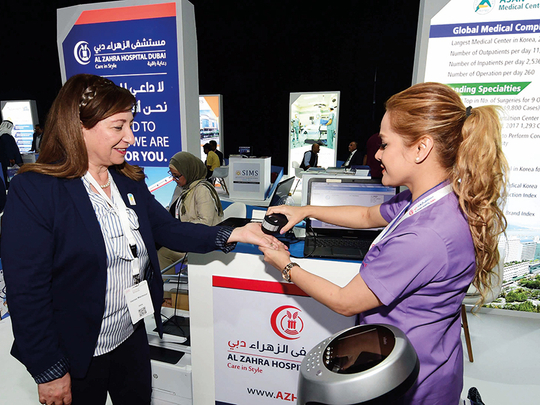
Dubai: Dubai will introduce a mandatory insurance product for health tourists to provide coverage for unseen complications during or after a procedure is completed, said a top health official during the second day of the Dubai International Health Tourism Forum (DITHF) on Tuesday.
“This programme has been in operation for health tourists for a while, but was optional. We are working with the Health Tourism Council to make the policy mandatory and embed it in the travel insurance required. This will improve the trust of any potential health tourist in Dubai, in the sense that if something goes wrong, they are fully covered,” Dr Al Yousuf told Gulf News.
With over 300,000 health tourists reported in 2016, Dubai is working to ensure it is positioned at the forefront when it comes to medical tourism and health insurance globally.
“We have identified that health tourists require a different kind of cover — the standard cover is not going to do the job. We need to ensure the whole Dubai experience is complete, whether it is visiting Dubai for tourism or medical reasons, there shouldn’t be any gaps that give a visitor a reason to be unhappy,” explained Dr Al Yousuf.
While Dubai made health insurance mandatory in November 2013, the emirate has ensured coverage for Emiratis and expats and is working on enhancing insurance coverage for tourists.
“Dubai is a leading tourist destination, and for the 2.8 million people living in the emirate, we have 15 million visitors a year. Any potential complication related to travellers is something we need to be aware of and have clear mechanisms to deal with. We have to provide visitors with the right level of security and confidence, that is if something goes wrong, it would be taken care of,” added Dr Al Yousuf.
He further referred to the 4.7 million people who are registered to have insurance in Dubai, pointing out that the number of insurance-related complaints falls below one per cent.
“Dubai residents can easily access the iPromise app to post a complaint about any insurance company. On average, we have 200-250 complaints per month, which totals up to around 3,000 complaints a year. Overall, we don’t see any major issues, but have individual cases,” said Dr Al Yousuf.
“The penetration of normal travel insurance is varied. In the UK, you see around 80-85 per cent of people buying travel insurance products, while in the GCC, we see less than five per cent actively buying travel insurance unless it’s required for a visa,” said Cooper.
He pointed out consumers often associate travel insurance with administrative processes rather than “financial and assistance protection processes”.
Trends in the insurance sector
“The GCC health insurance market closed at 8.5 billion in 2015 with Saudi Arabia being the largest contributor, closely followed by the UAE. After the implementation of the compulsory health insurance in Dubai, the number is expected to touch 20 billion by 2020,” said Dr Sebastian.
The global medial tourism market is estimated at $40-60 billion, with around 12-14 million travellers. The number is predicted to grow to 165 million by 2023, he added.
“When it comes to the UAE, the International Medical Travel Journal states that around 30,000 Emiratis travel abroad for medical treatment every year, spending an average of $250,000 per person,” said Dr Sebastian.
The leading causes of medical travel in the GCC are related to oncology, cardiology and cardiac surgery, orthopaedic surgery, bariatric surgery, fertility and reproductive treatments, and organ, cell and tissue transplantation.
“The strategy for Dubai is to transform the challenges into opportunities, by targeting global travellers, the expatriate diaspora, and international and regional health insurance companies and bringing the world to Dubai enhancing health care in terms of services, affordability and transparency,” concluded Dr Sebastian.












